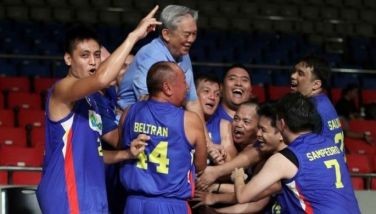Unresolved Olympic controversies
MANILA, Philippines — The Olympics is the gleaming zenith of human athletic achievement. The same cannot be said for the way it is organized. The International Olympic Committee relies heavily on the National Olympic Committee (NOC) of the host country, which in turn relies on the local national federation of each sport for the conduct of its competition. This leaves the Olympic Games vulnerable to error, bad judgment, bias and outright cheating, as in the examples below.
Athletics. Stockholm, 1912. Jim Thorpe was a poorly-educated native American track and field phenomenon, one of the greatest athletes of all time. In 1912, he won the decathlon by finishing first in seven events, and the first-ever men’s pentathlon by winning four of five. Some of his records stood for six decades. The following year, however, Thorpe was stripped of his medals after it was discovered that he had received a few dollars to play minor league baseball briefly in 1909 and 1910. The Olympics still did not allow professional athletes at the time. Bowing to public pressure in 1982, the IOC sent two replica medals to Thorpe’s family. However, his name has still not been restored in Olympic records.
Men’s basketball. Berlin, 1936. This one probably cost the Philippine Islands an Olympic gold medal at the first-ever basketball tournament. The German organizers feared a US boycott which would embarrass Adolf Hitler. Thus, they allowed Avery Brundage, the Germophile president of the US Olympic Committee, to do whatever he wanted. This included fielding two entire basketball teams which played alternately as one, with players well over the 6’3” height limit imposed on everyone else. Meanwhile, the Filipinos – nicknamed “The Islanders” – won their first three games. Then the Germans decided to shorten the tournament by declaring that any loss would henceforth relegate a team to the consolation bracket, announcing this the day before the Filipinos would suffer their only loss, to the US. So instead of fighting for a gold in a fair fight, The Islanders ended up fifth, albeit still the highest finish of any Asian team in Olympic basketball.
Men’s basketball. Munich, 1972. The US team had won the last seven golds in basketball. Both they and the USSR won their first eight games here convincingly, setting up the classic showdown. After trailing by 10 with 10 minutes to play, the Americans rallied, and Doug Collins was on the free throw line to give them a one-point lead with 10 seconds to go. The Soviets complained that they had called – and were not granted – a timeout before the second free throw. Unable to regroup, time ran out on them. Game over? Not quite. The clock was reset to give them an extra inbound. Twice. On the last instance, Sergei Belov caught a long pass for an uncontested lay-up, and the gold medal. To this day, the US team members have not accepted their silver medals, which sit in the IOC vault in Switzerland.
Athletics. Los Angeles, 1984. The most controversial race of the Olympics ever. Zola Budd Pieterse was a young, talented middle- and long-distance runner from South Africa who ran barefoot. The International Olympic Committee had banned South Africa due to apartheid. Budd was therefore not allowed to compete in LA. Then Great Britain hastily offered her citizenship, and she was able to go to the Games and race against her idol, the favored Mary Decker of the US. But at the start of the 3,000-meter race, Budd tripped Decker, injuring her and knocking her down. Booed by the anti-apartheid crowd, Budd dissolved into tears and finished without a medal.
Boxing. Atlanta, 1996. We all know this one. Mansueto Velasco of the Philippines was up against Daniel Petrov Bojilov in the finals of the 48-kilogram category in men’s boxing. Bojilov was the lone surviving Bulgarian boxer. In spite of a dominating first round, Velasco was behind on the judges’ score cards. This was the first time electronic scoring was being used in the Olympics. No matter what he did, the Filipino could not catch a break. The fix was in; Ron delos Reyes famously called it “the robbery in Atlanta.”
As long as the beholden run the Olympics, these things can and will happen.
- Latest
- Trending































